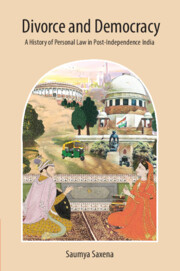Book contents
- Frontmatter
- Dedication
- Contents
- List of Figures
- Acknowledgements
- List of Abbreviations
- Introduction
- 1 Personal Law and the Making of Modern Religion, 1946–56
- 2 Committees, Codes, and Customs: Renegotiating Personal Law, 1957–69
- 3 Social Movements, National Emergency, and the Custody of the Constitution, 1967–79
- 4 Muslim Law, Hindu Nationalism, and Indian Secularisms, 1980–92
- 5 The Court in Context, 1992–2000s
- 6 From the Courtroom to the Courtyard: The Public Life of Personal Law, 2000–Present
- Conclusion
- Glossary
- Bibliography
- Index
Introduction
Published online by Cambridge University Press: 20 May 2022
- Frontmatter
- Dedication
- Contents
- List of Figures
- Acknowledgements
- List of Abbreviations
- Introduction
- 1 Personal Law and the Making of Modern Religion, 1946–56
- 2 Committees, Codes, and Customs: Renegotiating Personal Law, 1957–69
- 3 Social Movements, National Emergency, and the Custody of the Constitution, 1967–79
- 4 Muslim Law, Hindu Nationalism, and Indian Secularisms, 1980–92
- 5 The Court in Context, 1992–2000s
- 6 From the Courtroom to the Courtyard: The Public Life of Personal Law, 2000–Present
- Conclusion
- Glossary
- Bibliography
- Index
Summary
Why do you get afraid the moment divorce is mentioned? Why do you think your women will leave their homes and run to courts?
—Uma Nehru to N. C. Chatterjee and Nandlal Sharma Lok Sabha Debates on Hindu Marriage Bill, 2 May 1955.Their ‘fears’, it appears, were somewhat realized as in the decades to come women not only took their husbands but also the very provisions of divorce under Hindu, Muslim, and Christian personal laws to courts, provoking polarizing political debate.
Rights of women, of minorities, questions of secularism, and constitutionalism dominated the political and judicial discourses in independent India. Assigning meanings to these terms produced contestations which were formative of India's democracy. Family law, arguably the most visible sphere of such contestation, emerged as a particularly hospitable arena for conversations between religious and legal regimes. As the Indian state attempted to confront its discomfort with divorce, it entered into intimate dialogue with citizens, which was largely mediated through religion. Personal law, therefore, played a key role in determining the legal place for religion and the content of secularism in India's democracy.
Religious personal laws refer to the corpus of family laws in India that ostensibly are religiously ordained and somewhat statutorily backed. The ‘personal’ in personal law could refer to the ‘family’—to convey its status as a private realm beyond legal regulation. The term could also refer to religion, which as per certain idealized notions of secularism was deemed to be a private affair. The process of writing religion in statutory form, however, made both family and faith subject to public and parliamentary debates.
Personal law challenged the idea that separation between the church and the state was a precondition of democracy, as it made democracy contingent on the protection of religious freedom and diversity. This process had three significant consequences. First, it made religion more dynamic and capacious as it could be challenged by an ordinary citizen for violating or itself being violated by ‘law’. Second, it made the law responsive to, as well as suspicious of, social and religious movements as religious reform began to be routed through institutions of the state. Lastly, it rendered the courts independent and powerful, equipped to interpret religious law, align it with constitutional law, or deem it to be invalid or inessential to religion.
- Type
- Chapter
- Information
- Divorce and DemocracyA History of Personal Law in Post-Independence India, pp. 1 - 34Publisher: Cambridge University PressPrint publication year: 2022



